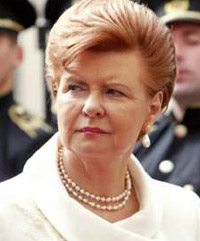It is difficult to understand whether the knowledge of people living in the Soviet Union was mainly economical or “politico-economical”. And accordingly it is difficult for post-soviet people to understand whether the ”economical effectiveness” is something economical or political. The last two weeks were pretty heavy. Armenia was busy with political life. You could see the flags of Finland and then Latvia on the way from the airport to the Matenadaran. The presidents of those countries visited Armenia one after another. Then the vice-president of India visited Armenia. The streets of Yerevan were periodically closed to escort the delegation led by the mayor of Moscow. Other delegations visited Armenia too, but only these 4 delegations are of my interest. The reason is that besides the political cooperation, the society has economical expectations too. Usually businessmen keep state officers’ company during official visits. Their problem is not to take care of their expenses in foreign countries. Those businessmen try to solve economical problems during official meetings. That is why I’d like to draw your attention to the economical background of these visits. Finland, Latvia and India don’t take on serious roles in the foreign economical policy of Armenia. The import from Finland covers about 2-2,5 million USD per year. The import from Latvia covers up to 1,5 million USD, and the import from India -up to 0,5 million. The export is less. Armenia exports products for about 1 million USD to all these three countries together per year. The factor of economical cooperation with these countries is evaluated as 0-05 % in all official publications. Accordingly, the economical effect of these leaders’ visits can be evaluated as “zero”. Mass Media didn’t discuss the economical aspect of these visits when broadcasting them. It did its best not to. They informed that a lot of businessmen kept the company of the president of Latvia during their visit. But they didn’t inform what they did during the visit; probably because of the fact that these kinds of visits are not a standard for developing relations between the two countries concerned. For example, the mark of our export to Italy covered 3,7 % in 2002. But after the visit of our president and businessmen to Italy this mark went down to 2,8 % despite what they were expecting. We can say the same for the economical cooperation with Poland.
The president of Lithuania, Mrs. Vaira Vike-Fraiberga, visited the open market for souvenirs. However, she didn’t buy anything there. Instead of this, during the interview she announced that she advocated the territorial integrity of Azerbaijan. But this issue is political and out of this article’s interests. Accordingly we can say that the other visits didn’t have any economical effectiveness either. All of them, except the visit of the mayor of Moscow Youri Lujkov. According to the Armenian society and publications, representative of the Russian political elite is a serious investor for Armenia. According to sources, he is involved in a part of the constructions in the center of Yerevan. Armenia didn’t spend much money during Lujkov’s visit. But according to Lujkov, he felt like he was home in Armenia. The grand opening of the House of Moscow was broadcasted on TV. The mayor of Moscow left the mayor of Yerevan Ervand Zakharyan alone during this process and did it alone. This direct behavior of Lujkov has two explanations: political and economical. Russia places a key role in our foreign economical policy. The mark of export to Russia covers about 13-15 % per year, and the import- 16-20 %. According to non-official sources, about 55-60 % of money transfers from abroad are made from Russia. It is a long time already that Moscow is one of the three cities in the world having the most Armenian population. But of course, this is not enough for Lujkov to feel at home. This can be explained by the fact that everything is more political and is connected with the definition of Armenia as “a regional basement”. That is why the dominant part of the “politico-economy” term is politics. The economical cooperation is not stable in Armenia yet. This was clear during all the visits and because of the fact that our economy changes like the weathers of year. For example, the official statistics state that the mark of export in August was 14 % less than in July. In fact, in our country all the marks consist of two numbers, and it doesn’t depend on whether those marks concern the development or are just evaluated for comparison. I.e. appreciable and rapid. Stability (the government is proud of this) has no economical basis. Accordingly, the interests of other countries in Armenia don’t depend on economical interests. And even in case when there are a lot of businessmen within the foreign delegations, the main reason of their visit is political. But of course, you are free to insist that they visit Armenia as tourists to see an old country, which has a rich culture.

